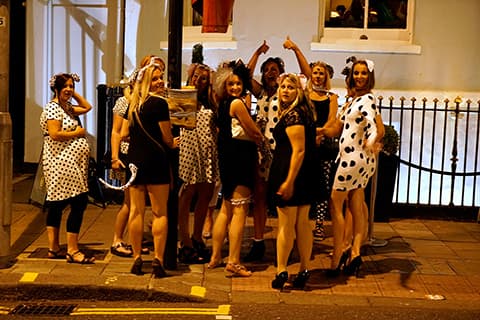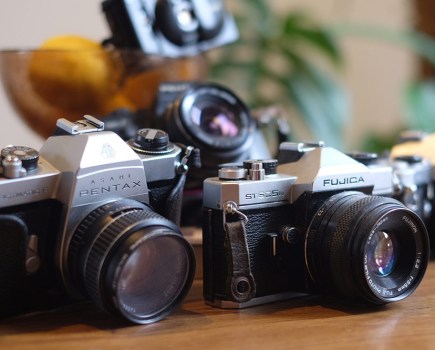One of around a dozen images taken in Brighton by photographer Richard Selby, who was not arrested. Police claim that another of his images shows a teenage girl in ‘hotpants’ and was ‘inappropriate’ [Copyright, Richard Selby 2014]
The police warning, following a clash in Brighton, East Sussex, last month, echoes accusations of antisocial behaviour levelled at a photographer in 2009 before controversial anti-terror laws were repealed. This case eventually led to Lancashire Police paying out thousands of pounds in an out-of-court settlement to amateur photographer Robert Patefield, who sued the force for wrongful arrest.
The latest spat involves 81-year-old photographer Richard Selby, who has filed a complaint with Sussex Police claiming that an officer threatened to arrest him if he did not identify himself.
Selby – a former assistant to renowned American photographer Art Kane – ran into trouble while taking pictures of ‘hen parties’ in Brighton.
The former freelance photographer was approached by two police community support officers following complaints by members of the public at 11pm, in West Street, Brighton, on 25 July.
Selby says the people being photographed had not objected to his picture-taking, and that he had only taken a couple of photos when the officers approached.
The incident led to the PCSOs calling a police constable who, Selby claims, asked for his name.
‘I said, “I don’t have to give you my name”, and he said, “I could arrest you”.’
The constable then summoned a police sergeant to the scene.
Feared ‘spending weekend’ in cells
Selby says he supplied the sergeant with his name, for fear of ‘spending the weekend in police cells’, and he agreed to ‘go home’.
‘It was intimidating… surrounded by four police [officers] demanding my name and threatening me,’ Selby told Amateur Photographer (AP).
The force claims that one of Selby’s photographs shows ‘a teenage girl’s bottom in hotpants with her lower buttocks clearly visible’.
A Sussex Police spokesman added: ‘The sergeant suggested [to Selby] that this wasn’t appropriate.’
In response, Selby told AP that he did not believe the girl in the shot to be a teenager.
And he denies the force’s claim that he was ‘holding the camera low around his groin and taking photographs of the girls when they were bending over’.
Selby stresses that the officers were satisfied his pictures had not broken any law after reviewing them on his digital camera, a Sony Alpha 7R.
The veteran photographer, who has worked in New York, Paris and Milan – and spent several years working at the German edition of Playboy – told AP: ‘I was just taking pictures in the street.’
Police deny that officers threatened Selby with arrest.
A Sussex Police spokesman added: ‘Police officers on patrol in Brighton city centre were informed by two members of the public (one being a security staff doorman) that they were concerned for the safety of a man who was taking photographs of a group of girls.
‘They [the officers] felt he might be in danger if he came to the attention of a group of men who were in the vicinity of the girls who may have taken exception to him taking photographs.’
The spokesman said the sergeant advised Selby that ‘his actions may be considered to be antisocial’.
Selby says he was taking shots for a personal project about Brighton, where he lives, and had no plans to sell them.
He estimates that the police incident lasted at least half an hour, during which time he took around a dozen shots.
Antisocial behaviour laws
Section 50 of the Police Reform Act 2002 requires a person to give their name and address if an officer believes that a person ‘has been acting, or is acting, in an antisocial manner’.
However, Sussex Police say they did not formally ask for the photographer’s name and address under the Act.
The Crime and Disorder Act 1998, which deals with antisocial behaviour orders, defines ‘antisocial’ as acting in a ‘manner that caused or was likely to cause harassment, alarm or distress to one or more persons not of the same household as himself’.
‘This was not the excuse given to me at the time I was stopped, when they said I might have been photographing indecent acts or minors,’ claims Selby, who branded any such suggestion ‘ridiculous’.
‘I think this is a new interpretation of the [Crime and Disorder Act 1998] and very dangerous for every photographer, as it would imply that taking a photograph can be “antisocial behaviour”.’
In an earlier statement, issued yesterday, Sussex Police said: ‘An elderly man was stopped late at night in Brighton city centre after complaints were received by officers from members of the public about him taking photographs of women dressed for hen nights.
‘He was acting in an antisocial manner and in these circumstances a police officer may request a name and address to establish a person’s identity.
‘There is a power of arrest if this is refused.’
Selby says he plans to take his complaint to the local police commissioner, and may take the matter up with the Home Secretary.







